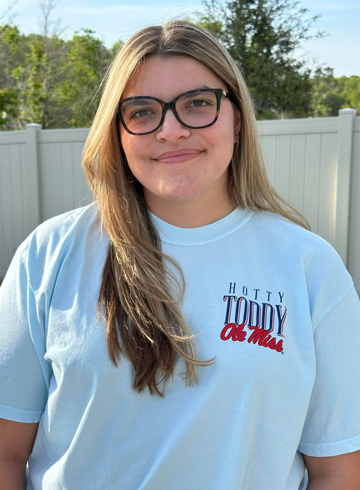Clinical-Disaster Research
Focus on research, education, and service in disaster mental health

Join Our Researchers
The University of Mississippi’s Clinical-Disaster Research Center (UM-CDRC) is comprised of a diverse team of researchers. Housed within the Department of Psychology, the UM-CDRC focuses on research, education, and service in disaster mental health. Research is a core aspect that underlies our initiative and efforts. Serving the community is the ultimate goal.
Since the Center was established in 2010, we have geared our efforts toward research, consultation, program evaluation, service, and training. The Center has been involved with a variety of different projects in collaboration with such agencies as the American Red Cross, the Mississippi Department of Mental Health, and the University of Mississippi.
Currently, the UM-CDRC is committed to analyzing and disseminating data collected following the 2010 Gulf Oil Spill. We are also committed to the development of evidence-based practices for disaster preparedness, and to the training of graduate clinicians, as well as the general public, in the most effective ways to prepare for, and respond to, disasters. The team is engaged in raising awareness in the community, teaching such important skills as psychological first aid (PFA).

Meet a Clinical-Disaster Research Team Member
Within the Clinical Disaster Research Team, Riley is interested in military mental health, first responder mental health, PTSD, and protective factors. More specifically, she is interested in the preparedness of military personnel for service and the protective factors utilized by veterans who become first responders.
Riley Curie
Ph.D. Clinical Psychology
Fundamental Aspects of Our Work
Published Research
- Johnson, C., Moore, B., Hampton, B. N., McCutcheon, V. E., Kim, Y., Lucas, K. A., & Schulenberg, S. E. (2024, April). It’s all relative: Examining the impact of social connectedness, gratitude, and mindfulness on satisfaction with life among college students using relative weight analysis. Poster presented at the 9th annual University of Mississippi Psychological Research Day, University, MS.
- Kim, Y. & Schulenberg, S. E. (2024, April). From anxiety to purpose in life amid ongoing COVID-19 stress: Examining the serial mediation of social connectedness and resilience. Poster presented at the annual meeting of ResilienceCon, Nashville, TN.
- Hampton, B. N., Weber, M. C., & Schulenberg, S. E. (2023, November). Formal and informal help-seeking as predictors of current posttraumatic stress symptoms: Contrasting findings amongst sub-groups of trauma survivors. Poster presented at the annual meeting of the International Society for Traumatic Stress Studies, Los Angeles, CA.
- Hampton, B. N., Weber, M. C., Pavlacic, J. M., & Schulenberg, S. E. (2023, April). Caregiver substance misuse as a risk factor against posttraumatic growth in adulthood. Poster presented at the annual meeting of ResilienceCon, Nashville, TN.
- McCutcheon, V.E. & Schulenberg, S. E. (2023, April). Meaning in Life and Psychological Distress: Examining Factors for Veterans’ Psychological Adaptation to Civilian Life. Poster presented at the annual meeting of ResilienceCon, Nashville, TN.
- Lucas, K.A., Semko, J., Raley, M., & Schulenberg, S. E. (2023, April). Is Purpose in Life, Psychological Adaptation, or Psychological Distress More Important For Veterans’ Satisfaction with Life? Using Relative Weight Analysis to Identify Expedient Variables For Intervention. Poster presented at the annual meeting of ResilienceCon, Nashville, TN.
- Lucas, K. A, Hampton, B. N., Fortner, S.R.M., *Pavlacic, J. M., & Schulenberg, S. E. (2022, April). Role of experiential avoidance in the relationship between resilience and post-traumatic stress.** Poster presented at the annual meeting of ResilienceCon (virtual).
- Pavlacic, J. M., Schulenberg, S. E., & Buchanan, E. M. (2020, March). Meaning, purpose, and experiential avoidance as predictors of valued behavior: A daily diary study. In S. C. Hayes, Discussant, New Research Directions at the Interface of Values and Psychological Flexibility. Symposium submitted to the 54th Annual Convention of the Association for Behavioral and Cognitive Therapies, Philadelphia, Pennsylvania.
- Pavlacic, J. M., Buchanan, E. M., McCaslin, S. E., & Schulenberg, S. E. (2020, March). A systematic review of posttraumatic stress and resilience trajectories and covariates in veterans and service members. Poster submitted to the 54th Annual Convention of the Association for Behavioral and Cognitive Therapies, Philadelphia, Pennsylvania
- Weber, M. C., Hampton, B. N., & Schulenberg, S. E. (2024). Positive Psychological Predictors of Preparedness for Tornadoes, Structural Fires, and Large-Scale Disease Outbreaks: A Study of US University Students and Employees. Natural Hazards Review, 25(3), 04024016.
- Fischer, I. C., Feldman, D. B., Tsai, J., Harpaz-Rotem, I., Lucas, K. A., Schulenberg, S. E., & Pietrzak, R. H. (2023). Identifying significant correlates of purpose in life in older US military veterans: results from the national health and resilience in veterans study. International Psychogeriatrics, 35(10), 560-565.
- Weber, M. C., & Schulenberg, S. E. (2023). The curvilinear relationships between posttraumatic growth and posttraumatic stress, depression, and anxiety. Traumatology, 29(2), 249.
- Fischer, I. C., Feldman, D. B., Tsai, J., Harpaz-Rotem, I., McCutcheon, V. E., Schulenberg, S. E., & Pietrzak, R. H. (2023). Purpose in life and physical health in older US military veterans: Cross-sectional results from the National Health and Resilience in Veterans Study. Preventive Medicine, 170, 107495.
- Veazey, L. G., Weber, M. C., & Schulenberg, S. E. (2023). A Psychometric Validation of the Claremont Purpose Scale with an Emerging Adult University Student Population. Journal of Prevention and Health Promotion, 4(2), 200-222.
- Pavlacic, J. M., Dixon, L. J., Schulenberg, S. E., & Buchanan, E. M. (2022). Examining daily-level associations between nightly alcohol use and next-day valued behavior in college students. Journal of American college health, 70(4), 963-967.
- McCutcheon, V. E., Grant, J. B., & Schulenberg, S. E. (2020). Answering the Call of COVID-19: An Integrated Mental Health Response Considering Education, Training, Research, and Service. Psychological Trauma: Theory, Research, Practice, and Policy. Advance online publication.
- Boullion, G. Q., Pavlacic, J. M., Schulenberg, S. E., Steger, M. F., & Buchanan, E. M. (2020).
Meaning, social support, and resilience predict posttraumatic growth among survivors of the August 2016 Louisiana flooding. American Journal of Orthopsychiatry. - Finkelstein-Fox, L., Pavlacic, J. M.,Schulenberg, S. E., Buchanan, E. M., & Park, C. L. (2019). Valued living in daily experiences: Relations with meaning, mindfulness, psychological flexibility, and stressors. Cognitive Therapy and Research. Advance online publication.
- Davis, C. N., Weber, M. C., Schulenberg, S. E., & Green, J. J. (2019). University Students’ Disaster Preparedness: A Focus Group Study. Best Practices in Mental Health, 15(2), 29-47.
- Pavlacic, J. M., Buchanan, E. M., Maxwell, N. P., Hopke, T. G., & Schulenberg, S. E. (2019). A Meta-Analysis of Expressive Writing on Posttraumatic Stress, Posttraumatic Growth, and Quality of Life. Review of General Psychology, 23(2), 230–250.
- Weber, M. C., Pavlacic, J. M., Gawlik, E. A., Schulenberg, S. E., & Buchanan, E. M. (2019). Modeling resilience, meaning in life, posttraumatic growth, and disaster preparedness with two samples of tornado survivors. Traumatology.Advance online publication.
- Weber, M. C., & Schulenberg, S. E., & Lair, E. C. (2018). University employees’ preparedness for natural hazards and incidents of mass violence: An application of the Extended Parallel Process Model. International Journal of Disaster Risk Reduction.
- Tkachuck, M. A., Schulenberg, S. E., & Lair, E. C. (2018). Natural disaster preparedness in college students: Implications for institutions of higher learning. The Journal of American College Health.
Foundational Readings:
- Schulenberg, S. E., Baczwaski, B. J., & Buchanan, E. M. (2014). Measuring search for meaning: A factor-analytic evaluation of the Seeking of Noetic Goals test (SONG). Journal of Happiness Studies, 15, 693-715.
- Drescher, C. F., Schulenberg, S. E., & Smith, C. V. (2014). The Deepwater Horizon Oil Spill and the Mississippi Gulf Coast: Mental health in the context of a technological disaster. American Journal of Orthopsychiatry, 84, 142-151.
- Drescher, C. F., Baczwaski, B. J., Walters, A. B., Aiena, B. J., Schulenberg, S. E., & Johnson, L. R. (2012). Coping with an ecological disaster: The role of perceived meaning in life and self-efficacy following the Gulf Oil Spill. Ecopsychology, 4, 56-63.
- Schulenberg, S. E., Strack, K. M., & Buchanan, E. M. (2011). The Meaning in Life Questionnaire: Psychometric properties with individuals with serious mental illness in an inpatient setting. Journal of Clinical Psychology, 67, 1210-1219.
- Schulenberg, S. E., Schnetzer, L. W., & Buchanan, E. M. (2011). The Purpose in Life test-Short Form: Development and psychometric support. Journal of Happiness Studies, 12, 861-876.
- Schulenberg, S. E., & Melton, A. M. A. (2010). A confirmatory factor-analytic evaluation of the Purpose in Life test: Preliminary psychometric support for a replicable two-factor model. Journal of Happiness Studies, 11, 95-111.
- Nassif, C., Schulenberg, S. E., Hutzell, R. R., & Rogina, J. M. (2010). Clinical supervision and logotherapy: Discovering meaning in the supervisory relationship. Journal of Contemporary Psychotherapy, 40, 21-29.
- Strack, K. M., & Schulenberg, S. E. (2009). Understanding empowerment, meaning, and perceived coercion in individuals with serious mental illness. Journal of Clinical Psychology, 65, 1137-1148.
- Schulenberg, S. E., Hutzell, R. R., Nassif, C., & Rogina, J. M. (2008). Logotherapy for clinical practice. Psychotherapy: Theory, Research, Practice, Training, 45, 447-463.
- Melton, A. M. A., & Schulenberg, S. E. (2008). On the measurement of meaning: Logotherapy’s empirical contributions to humanistic psychology. The Humanistic Psychologist, 36, 31-44.
- Raley, M. J., Weber, M. C., Lemon, C. E., & Schulenberg, S. E. (2020). The disaster sciences interdisciplinary minor at the University of Mississippi: Positive psychology in action. In S. E. Schulenberg (Ed.), Disaster mental health and positive psychology. New York, NY: Springer.
- Liberto, A. K., Johnson, E. T., & Schulenberg, S. E. (2020). Responding to Adolescents following Natural and Technological Disasters: The Essential Nature of Hope. In Schulenberg, S. E. (Ed.), Disaster mental health and positive psychology. New York, NY: Springer.
- Baczwaski, B. J., Aiena, B. J., & Schulenberg, S. E. (2018). The Deepwater Horizon oil spill. In D. McElreath et al. (Eds.), Disasters that shaped emergency management. Dubuque, IA: Kendall Hunt. ISBN: 9781524962029
- Liberto, A. K., Pavlacic, J. M., & Schulenberg, S. E. (2018). The Great Atlanta Fire of 1917. In D. McElreath et al. (Eds.), Disasters that shaped emergency management. Dubuque, IA: Kendall Hunt. ISBN: 9781524962029
- Pavlacic, J. M., Gawlik, E. A., & Schulenberg, S. E. (2018). The 1995 Chicago Heat Wave. In D. McElreath et al. (Eds.), Disasters that shaped emergency management. Dubuque, IA: Kendall Hunt. ISBN: 9781524962029
- Weber, M. C., Gawlik, E. A., & Schulenberg, S. E. (2018). Hurricane Sandy. In D. McElreath et al. (Eds.), Disasters that shaped emergency management. Dubuque, IA: Kendall Hunt. ISBN: 9781524962029
- Schulenberg, S. E. (2017). Embracing uncertainty as a means to discover meaning in life. In N. Tanase (Ed.), What is the meaning of life? A journey into the wisdom of life (pp. 766-767). Independently published.
- Russo-Netzer, P., Schulenberg, S. E., & Batthyany, A. (Eds.). (2016). Clinical perspectives on meaning: Positive and existential psychotherapy. Switzerland: Springer International Publishing. ISBN: 978-3-319-41397-6
- Weathers, L. N., Aiena, B. J., Blackwell, M. A., & Schulenberg, S. E. (2016). The significance of meaning to conceptualizations of resilience and posttraumatic growth: Strengthening the foundation for research and practice. In P. Russo-Netzer, S. E. Schulenberg, & A. Batthyany (Eds.), Clinical perspectives on meaning: Positive and existential psychotherapy (pp. 149-169). Switzerland: Springer International Publishing. ISBN: 978-3-319-41397-6
- Russo-Netzer, P. Schulenberg, S. E., & Batthyany, A. (2016). Clinical perspectives on meaning: Understanding, coping and thriving through science and practice. In P. Russo-Netzer, S. E. Schulenberg, & A. Batthyany (Eds.), Clinical perspectives on meaning: Positive and existential psychotherapy (pp. 1-13). Switzerland: Springer International Publishing. ISBN: 978-3-319-41397-6
- Schulenberg, S. E. (Ed.). (2016). Clarifying and furthering existential psychotherapy: Theories, methods, and practices. Switzerland: Springer International Publishing. ISBN: 978-3-319-31086-2
- Schulenberg, S. E. (2016). Clarifying and furthering existential psychotherapy: An introduction. In S. E. Schulenberg (Ed.), Clarifying and furthering existential psychotherapy: Theories, methods, and practices (pp. 1-4). Switzerland: Springer International Publishing. ISBN: 978-3-319-31086-2
- Florez, I. A., Schulenberg, S. E., & Stewart, T. L. (2016). Meaning and automatic stereotyping: Advancing an agenda for research. In A. Batthyany (Ed.), Logotherapy and Existential Analysis: Proceedings of the Viktor Frankl Institute, Vienna (Vol. 1, pp. 107-124). Switzerland: Springer International Publishing. doi:10.1007/978-3-319-29424-7_11
- Schulenberg, S. E., Drescher, C. F., & Baczwaski, B. J. (2014). Perceived meaning and disaster mental health: A role for logotherapy in clinical-disaster psychology. In A. Batthyany and P. Russo-Netzer (Eds.), Meaning in positive and existential psychology (pp. 251-267). New York: Springer. doi:10.1007/978-1-4939-0308-5_15
- Schulenberg, S. E., Sattler, J. M., & Renk, K. (2014). Intellectual disability. In J. M. Sattler, Foundations of behavioral, social, and clinical assessment of children (6th ed., pp. 517-537). San Diego, CA: Jerome M. Sattler.
- Buchanan, E. M., Valentine, K. D., & Schulenberg, S. E. (2014). Exploratory and confirmatory factor analysis: Developing the Purpose in Life test – Short Form (PIL-SF). In P. Bindle (Ed.), Sage research methods cases. Thousand Oaks, CA: Sage. doi:10.4135/978144627305013517794
- Schulenberg, S. E., & Florez, I. A. (2013). Advancing logotherapy as a science: A research imperative – Part two. The International Forum for Logotherapy, 36, 41-50.
- Ortiz, E. M., Schulenberg, S. E., & Pacciola, A. (2013). Introducción a la psicoterapia centrada en el sentido o psicoterapia de orientación logoterapéutica. In E. M. Ortiz (Ed.), Manual de psicoterapia con enfoque logoterapéutico (pp. 23-40). Bogota, Colombia: Editorial El Manual Moderno.
- Schulenberg, S. E., & Gohm, C. L. (2009). An exploratory factor analysis of the Seeking of Noetic Goals test (SONG). In A. Batthyany & J. Levinson (Eds.), Existential psychotherapy of meaning: Handbook of logotherapy and existential analysis(pp. 503-511). Phoenix, AZ: Zeig, Tucker & Theisen.
- Schulenberg, S. E., Kaster, J. T., Nassif, C., & Johnson-Jimenez, E. K. (2008). Assessment of psychopathology. In M. Hersen & A. M. Gross (Eds.), Handbook of clinical psychology: Vol. 2. Children and adolescents (pp. 520-550). Hoboken, NJ: John Wiley & Sons.
- Strack, K. M., Dunaway, M. H., & Schulenberg, S. E. (2008). On the multicultural utility of the 16PF and the CPI-434 in the United States. In L. A. Suzuki & J. G. Ponterotto (Eds.), Handbook of multicultural assessment: Clinical, psychological, and educational applications (3rd ed., pp. 375-401). San Francisco, CA: Jossey-Bass.
Join the CDRC Team
Undergraduate Research Assistants
Becoming an research assistant provides students with a unique opportunity while completing their undergraduate education. Our undergraduate research assistants engage in numerous opportunities such as working with graduate students on their thesis and/or dissertation projects, participating in experimental protocols, running participants, attending weekly lab meetings, and learning how to conduct literature searches. Additionally, many of our undergraduate research assistants participate in projects that lead to authorship on peer-reviewed publication and book chapters. Past undergraduate research assistants have also attended state, regional, and national professional conferences, expanding their experience to network with other students in the psychology field as well as prominent researchers. Professional development opportunities with the lab’s graduate students are integrated throughout the year. Undergraduates registered in the Honors College may have the opportunity to complete their Honors thesis through research projects that are currently being conducted.
Prerequisites
Required: An overall GPA of 3.0 or higher, along with consent of the instructor.
Recommended: PSY 417 (Disasters and Mental Health) or PSY 430 (Positive Psychology).
If you are interested in joining the CDRC lab, please contact Dr. Schulenberg at sschulen@olemiss.edu.
Graduate Students
Dr. Schulenberg will be reviewing graduate student applications for the 2025-2026 academic year. Competitive applicants will have prior research experience and interests that complement the foci and/or methodology of the CDRC lab. These include, though not limited to, meaning in life, positive psychology, trauma, PTSD, veteran research, and natural disasters. The mission of the UM-CDRC is to integrate service, training, and research in disaster mental health. It is our hope that by providing graduate students with a range of didactic and hands-on experiences, we are preparing future clinicians and researchers to be able to better understand the experiences of those affected by disasters and trauma, and thus be better able to assist in recovery efforts.
Please see the Clinical Psychology Graduate Program webpage for more information about the application process and requirements.

Meet a Clinical-Disaster Research Team Member
Brittany’s research interests include military mental health, PTSD, and integrated care. More specifically, she is interested in improving the accessibility and quality of mental health treatments for veterans.
Brittany Hampton
Clinical Graduate Student
